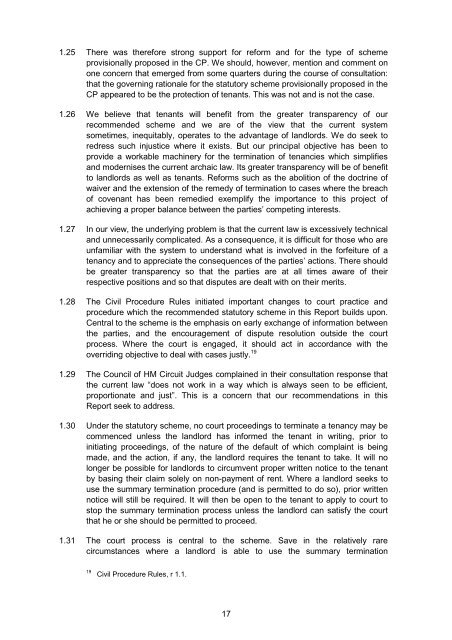Termination of Tenancies for Tenant Default - Law Commission
Termination of Tenancies for Tenant Default - Law Commission
Termination of Tenancies for Tenant Default - Law Commission
Create successful ePaper yourself
Turn your PDF publications into a flip-book with our unique Google optimized e-Paper software.
1.25 There was there<strong>for</strong>e strong support <strong>for</strong> re<strong>for</strong>m and <strong>for</strong> the type <strong>of</strong> scheme<br />
provisionally proposed in the CP. We should, however, mention and comment on<br />
one concern that emerged from some quarters during the course <strong>of</strong> consultation:<br />
that the governing rationale <strong>for</strong> the statutory scheme provisionally proposed in the<br />
CP appeared to be the protection <strong>of</strong> tenants. This was not and is not the case.<br />
1.26 We believe that tenants will benefit from the greater transparency <strong>of</strong> our<br />
recommended scheme and we are <strong>of</strong> the view that the current system<br />
sometimes, inequitably, operates to the advantage <strong>of</strong> landlords. We do seek to<br />
redress such injustice where it exists. But our principal objective has been to<br />
provide a workable machinery <strong>for</strong> the termination <strong>of</strong> tenancies which simplifies<br />
and modernises the current archaic law. Its greater transparency will be <strong>of</strong> benefit<br />
to landlords as well as tenants. Re<strong>for</strong>ms such as the abolition <strong>of</strong> the doctrine <strong>of</strong><br />
waiver and the extension <strong>of</strong> the remedy <strong>of</strong> termination to cases where the breach<br />
<strong>of</strong> covenant has been remedied exemplify the importance to this project <strong>of</strong><br />
achieving a proper balance between the parties’ competing interests.<br />
1.27 In our view, the underlying problem is that the current law is excessively technical<br />
and unnecessarily complicated. As a consequence, it is difficult <strong>for</strong> those who are<br />
unfamiliar with the system to understand what is involved in the <strong>for</strong>feiture <strong>of</strong> a<br />
tenancy and to appreciate the consequences <strong>of</strong> the parties’ actions. There should<br />
be greater transparency so that the parties are at all times aware <strong>of</strong> their<br />
respective positions and so that disputes are dealt with on their merits.<br />
1.28 The Civil Procedure Rules initiated important changes to court practice and<br />
procedure which the recommended statutory scheme in this Report builds upon.<br />
Central to the scheme is the emphasis on early exchange <strong>of</strong> in<strong>for</strong>mation between<br />
the parties, and the encouragement <strong>of</strong> dispute resolution outside the court<br />
process. Where the court is engaged, it should act in accordance with the<br />
overriding objective to deal with cases justly. 19<br />
1.29 The Council <strong>of</strong> HM Circuit Judges complained in their consultation response that<br />
the current law “does not work in a way which is always seen to be efficient,<br />
proportionate and just”. This is a concern that our recommendations in this<br />
Report seek to address.<br />
1.30 Under the statutory scheme, no court proceedings to terminate a tenancy may be<br />
commenced unless the landlord has in<strong>for</strong>med the tenant in writing, prior to<br />
initiating proceedings, <strong>of</strong> the nature <strong>of</strong> the default <strong>of</strong> which complaint is being<br />
made, and the action, if any, the landlord requires the tenant to take. It will no<br />
longer be possible <strong>for</strong> landlords to circumvent proper written notice to the tenant<br />
by basing their claim solely on non-payment <strong>of</strong> rent. Where a landlord seeks to<br />
use the summary termination procedure (and is permitted to do so), prior written<br />
notice will still be required. It will then be open to the tenant to apply to court to<br />
stop the summary termination process unless the landlord can satisfy the court<br />
that he or she should be permitted to proceed.<br />
1.31 The court process is central to the scheme. Save in the relatively rare<br />
circumstances where a landlord is able to use the summary termination<br />
19 Civil Procedure Rules, r 1.1.<br />
17

















